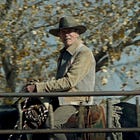Reading, Watching, Listening 11/01/2024
A few words about anxiety
I’ve been feeling anxious all week. At first I didn’t understand why. My mind was racing on a variety of problems plaguing me, each one its own little source of anxiety, but I was confused. I had those things basically under control and I’d been okay for a while now. So I thought through it, asking myself, what was different? I quickly realized the difference was the proximity of the American election. I’m not even American, but it doesn’t matter. I look around me and see a world that’s about ready to crack, and an event like Trump returning to office south of the border is just too much for me to contemplate. Hence the anxiety.
There’s not much for me to say on this front. My perspective is an outside one, but I hope Kamala Harris wins. I’m skeptical of her in many ways, and I have little faith in the Democratic Party as an institution, and I am disgusted by Biden and the party’s blank cheque support for Israel’s revenge-fuelled campaign of mass death in Gaza. Still, I hope Harris wins, because the alternative is outright nightmarish. How you vote is your business, and if you’re withholding that vote because of the genocide, I will not argue with you. That is a reasonable choice. But know this: things can always get worse. As bad as things are, worse is always a possibility. Reality is uncaring. It is us, the people, who must take whatever actions we can to tug reality in a better direction. Voting is just one small action, but an action nonetheless.
Mati Diop’s Dahomey, a documentary about the repatriation of looted artworks to Benin, is out today in limited release. It’s one of the year’s best films. I wrote about it briefly during TIFF, but I wanted to highlight it again now that more people, in a few cities around North America, can go see it. Dahomey is part fly-on-the-wall look at the process of repatriation, and the debate among students in Benin about the meaning of the repatriation, as well as part poetic meditation on the idea of culture itself, its relation to history and to people in the present. It’s about colonialism, of course, and all its ravages, but Dahomey is also about the future, what that future might look like, and how that future might arrive.
Here on the newsletter, it was a big week, as I finished off the last remaining films of my Late Eastwood series, packing in four films. Just a few hours after this newsletter update is sent out, I’ll be sitting in a theatre—the only one in Canada playing it—to watch what could be Eastwood’s last film: Juror #2. Look forward to a few words about that one in the coming days.
Reading, Watching, Listening
Despite filling so much of my week with Eastwood movies, I still managed to get to a few other things I’d like to share.
Watchmen author Alan Moore wrote a scathing piece about fan culture for The Guardian, and I don’t have much to say about it other than that I co-sign all of it. “Quite liking something is OK. You don’t need the machete or the megaphone.”
Kalil Haddad presented a programme of his experimental short film work here in Toronto this week, including the premieres of a couple made from archival material. A local filmmaker, Haddad is, in my opinion one of the most exciting artists I’ve come across in the last few years. His films explore, in large part, the experiences of queer youth, both in personal memory, and historical memory. They can be disturbing films, and abbrasive, but also invigorating, challenging, and thought-provoking. His film The Taking of Jordan (All American Boy) is of particular note. On his portfolio site, Haddad has links to several of his films available to stream online, including The Taking of Jordan. I highly recommend checking them out.
“In the Annex and Crescent Town, Two Sides to Toronto’s Density Dilemma”, by Simon Lewsen, is the big new feature over at The Local, taking a very deep dive into the history of two adjascent Toronto neighbourhoods and their opposite experiences of densification. It’s the story of a city where planning for a rise in population has been, in a word, poor. 50 years of mismanagement leading to a current crisis.
Toronto-based writer Will Sloan only updates his personal blog when it suits him, but it’s always a pleasure when he does, and this week he saw fit to look back on Biden-Era Cinema, identifying the films that define one waning political moment as we head into another. Will cites films like Top Gun: Maverick, The Zone of Interest, Sound of Freedom, Oppenheimer, Killers of the Flower Moon and others. On the risible Indiana Jones and the Dial of Destiny, he writes, “It opened with a digitally de-aged Harrison Ford moving and sounding like an octogenarian, and then put the present-day Ford through hours of gloopy CGI spectacle. It exists because Disney bought Fox, and you don’t buy assets to not put them to work.”
Billie Eilish’s “Birds of a Feather” is not some big discovery. It’s only one of the biggest songs in America right now, and I’ve heard it playing on the radio and elsewhere over the last month or so, since it was released as a single. I’m also not breaking any ground by saying Eilish and her brother are very talented musicians. But they’re very talented musicians, and “Birds of a Feather”, which I finally listened to properly, in full, the other day, is kind of a perfect pop song. Who knew? (Everyone)
See you all next week! Hopefully some of that anxiety will be put to bed by then.







